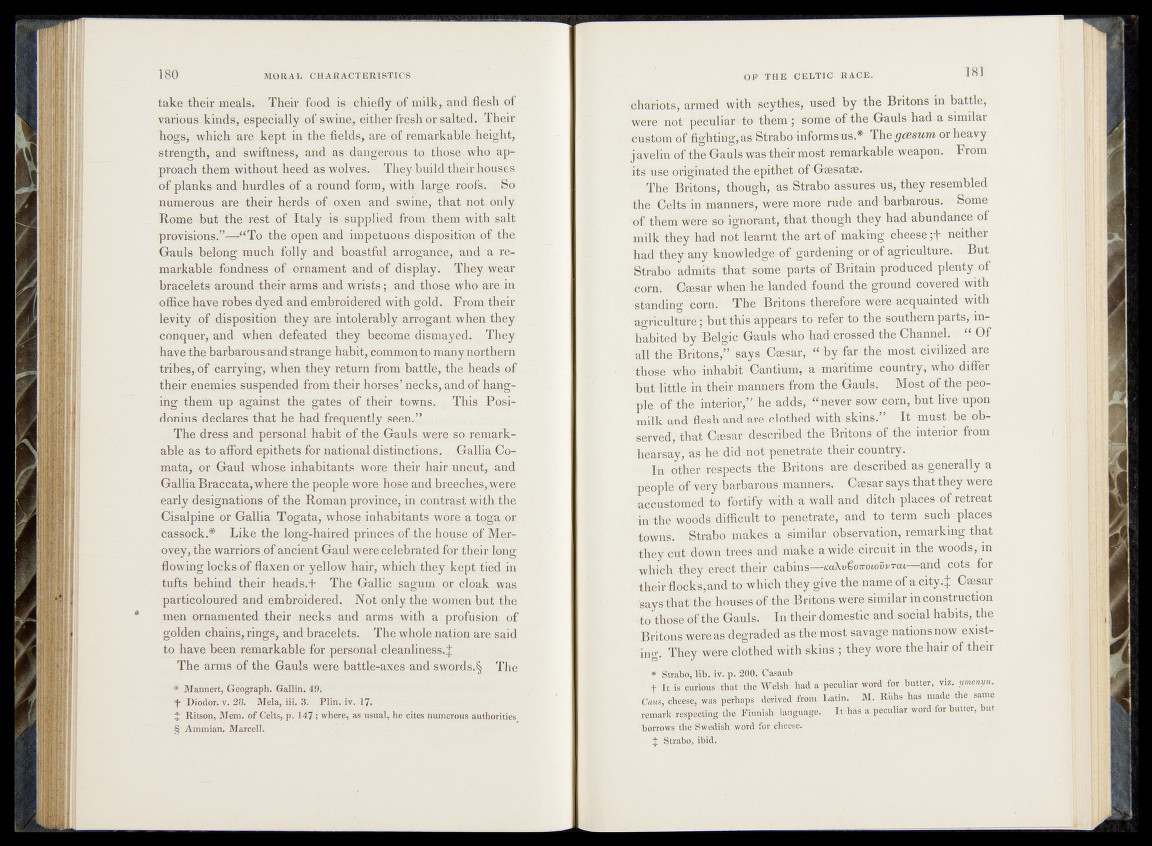
take their meals. Their food is mhiefiy of milk, and flesh of
various kinds* especially of swine; either fresh or-salted. Their
hogs, which are kept in the fields,- arse; of remarkable height,
strength, and swiftness, and. as dangerous, ten tbpse-, who TapV
proach them without heed as wolvesm-%Th.ey builffthebhquses
of planks and hurdles of a round form,- with large roofs* slSo
numerous are their herds ofioxen and swine, that not-only
Rome but the rest of Italy is.-supplied fro.mthem with salt
prdvisioiis.’,fr~<fTo the.open and impetuous disposition".of the
Gauls belong much folly and boastful arrogance, and a,remarkable
fondness of ornament and of display. They \ygar
bracelets around their arms and wrists; .and those who are in
office, have robes dyed and embroidered withigpld. Prom theijr
levity of disposition they are intolerably: arrogant when they
conquer, and when defeated they beeprne,ffipmaye(L* They
have the barbarous and strange habit, com.morj.fo mauyinorthei;n
tribes, of carrying, when they return from battle^ the sheads^of
their .enemies suspended from|||eir;horses^necJks, a n ^ f hanging
them up against the gates of their,towns. ; This Posidonius,
declares that he had frequently, .seen,,’/ .,
The dress and personal habit of the Gauls were, s$e remarkable
as to afford epithets for national distinctions.
mata, or Gaul whose inhabitants wore their hair,uncut, lanjd
Gallia Braccata, where ihep^pleworeThQSeundJ)re®Bhje|,ry¥ere,
early designations of the Roman province, injsonta^t with the
Cisalpine or Gallia Togata, whose inhabitants wpl-e-a toga^Qf,
cassock.* Like the long-hairedlprinces of the house of .Mef-
ovey> the warriors of ancient Gaul were celebrated for.th.eir, long
flowing locks of flaxen or yellow hair, which .they kept,itjed .in
.tufts behind their heads.+ The. Gallic sagum,.orr .cloak was
particoloured and embroidered. Not only the women but, the
men ornamented their necks and arms with a profusion of
golden chains, rings^ and bracelets. The whole nation are f.aid
to have been remarkable for personal-cleanliness.^;
The arms of the Gauls were battle-axes and swords.§ The
* Mannert, Geograph. Gallin. 49.
•f- piodor. v. 28. Mela, iii. 3. Plin. iv. 17.
X Ritson, Mem. a t (lefts* p. 147 $ where* as usual, he cites numerous atLtbhrities
§ Ammian. Marcell.
chariots, armed with scythes, used by the Britons in battle;
were not peculiar to them ; some of the Gauls had a similar
custöm of fighting, as? Strabo informs u s* The gce&um or heavy
-j'aVelin of the Gauls Was their most remarkable weapon. From
its uSe originated the epithet pf Gsesatae. -
The ‘ Briton's,*5 though, as1 Stralib "assures ’ us, they resembled
th é ‘éfélt's^in mannersj'W’eTdniore rude-,and barbarous. Some
‘of -them were^sëH'gnorant, that though they had abundance of
milk they5 had hot learn tth e art'of makirig4beese;fi neithër
had they any knbwfedgé^hgaifdening or of agriculture. But
-Strabo admits-dhat some 'pWts'óf-Britain produced plenty of
corn. ■ Caesar when he landed found the ground covered with
'%fcahdiho ^ o rri.’ The Britons thë'rëfdre wereiacquainted with
hgriëültiitë*; hut'this;appears to-refer to’the southern parts, inhabited
by Bei^M GaulS who had crossed* the Channel. “ Of
%tf the B rïtons,?4 Ws 1 by far the most civilized are
thosh- who--inhabit Cantium, a- maritime country, -whovdiffer
b r i t t l e 'in thëirimahhers from the' Gauls. Most of the peo-
j5lè pfHhe ifiteriör,” he^ad'ds^ ^neyeriêow corn, h u t live upon
milki-afeffesh aiM afe'clothed with skins.” It must be ob-
that èfeésfo dfe%Pribfeih5e> Britons of the interior from
h Mddthër-Vësp’ëctS the* Britons- are,,described as generally, a
ifhhplë o f very Imrharëns'manners. ‘ Caesar says that they were
'l^éilétbmed td fortify with a wall and ditch placesiof retreat
“iti thd #o^fi#'d;ifficult tQ;penetrate^andï to^term sueh places
töWnö; bï&tmbo makes a similar observation, remarking that
- ithe\d<3iit down'trees; ana;no®ke'a wide cm&ifem the woods, in
whiö’h thëy-'ëtêtt their cahins^KaXu€o7roiowTai—and .cots for
•their flocks,and to which they give themam©.ofiacity4 Caesar
.'slays that »the houses‘of the «Britons were similar in construction
to fh ó ^ ö f the GaulsW In their domestic and social habits, the
Britons were as degraded a-^ the most-savage‘.nations now existing.
They were clothed with skins «; they woré the hair of their
* Stratodj'liWiv. p. 200. Casaub
t It tlial the Welsh had a'peculiar word fpr butter, viz. ym e n y n .
chee§é>'waé perhaps derived from -Latin. M. Rühs has made the same
remark-respecting- the Finnish language^ I-t- has a peculiar word for butter, but
hórrows the Swedish Word for cheesê'. 'l
$ Strabo, ibid. 1